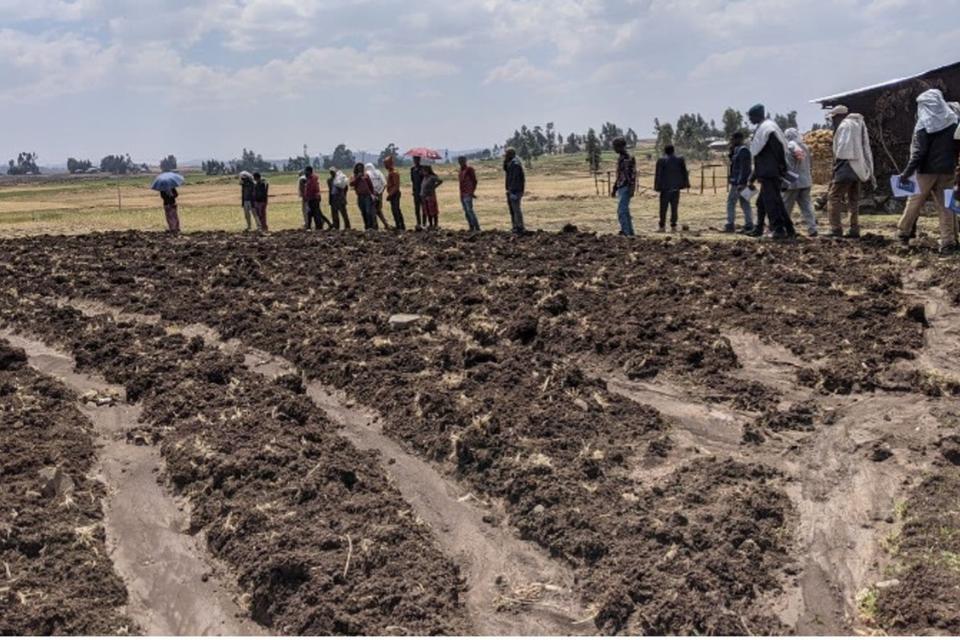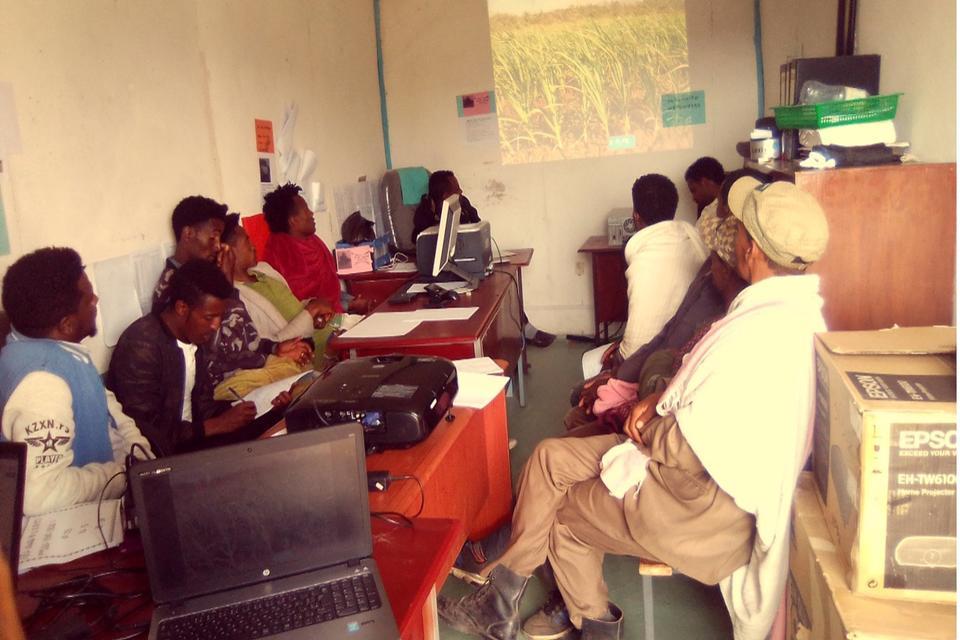Blog Transforming Ethiopian Food Systems: Leveraging Private Sector Incentives to Drive Agroecological Wheat Production

By Yodit Balcha, Degefie Tibebe, Mohammed Ebrahim, Viviane Filippi and Jonathan Mockshell
In recent years, Ethiopia has embarked on transforming the country's food system through different regulations and policies to achieve food security for its citizens. Its 'Cluster-based Agricultural Commercialization Strategy (CACS)' comes to one's mind when talking about policies to transform smallholder agriculture into a more commercially oriented and market-driven sector. Although the CACS has provided valuable contribution in organizing and supporting farmers through cluster-based approaches to increase economies of scale, improving access to inputs, markets, finance, and technology, to enhancing value chain integration and competitiveness, and moving towards achieving the Sustainable Development Goals (SDGs), the Paris Agreement, and biodiversity targets, there is a need to provide incentives and invest in agroecological practices that are sustainable, inclusive, and resilient.
The Private Sector Incentives and Investments (PSii) project, which is implemented by the Alliance of Bioversity International and CIAT, financed by the European Commission and managed by the International Fund for Agricultural Development (IFAD) represents a major step towards achieving sustainable and inclusive food systems under the CGIAR's Agroecological Transitions Program for Building Resilient, Inclusive, Agricultural and Food Systems (TRANSITIONS). The project aims to promote an agroecological transition in wheat production by generating informed decisions and maximizing the returns on investment to encourage public and private actors to leave behind 'business as usual' practices and transition to agroecological production approaches to transform Ethiopia's food system, increasing its environmental sustainability.
Engaging Stakeholders and Building an Enabling Policy Environment for Sustainable Food System Transformation
Agroecology is a key approach to sustainable agriculture in Ethiopia. Identifying the most effective modalities and incentive schemes to engage stakeholders can significantly accelerate the adoption of agroecological practices, transforming its agricultural landscape. The project has recently concluded its mission in Ethiopia where it engaged in discussions with government officials, research institutes, cooperatives, unions, and civil society.
During the week-long bilateral discussions and field visits, stakeholders at various levels delved into the critical question of introducing incentives and business models that would facilitate the transition towards a more sustainable food system, particularly in wheat production through cluster farming. To support decision making and investments, the PSii project emphasized the centrality of collecting and curating meaningful data and evidence to identify investment opportunities and evaluate the environmental, social, and financial returns associated with agroecological practices. The information generated will be made openly available through co-creation and stakeholder engagement platforms, thus allowing communities, governments, and investors to make informed decisions and transform food systems.
The recent mission conducted by the PSii project under the TRANSITIONS program highlights the potential and significance of agroecological practices for transforming wheat production in Ethiopia according to sustainability criteria. This was further emphasized during the bilateral meeting between the PSii project and Ethiopia’s Ministry of Agriculture (MoA) on the Participatory Agriculture & Climate Transformation (PACT) program. The discussions provided a clear direction on how PSii can contribute to PACT’s impactful work. Furthermore, experience from the PACT program emphasized the importance of assessing needs in specific lowland areas, and saw potential in the PSii project for scaling up options and providing different experiences. The meeting also identified opportunities for market linkages, incentive mechanisms, digital advisory systems, and capacity-building interventions in areas such as climate change and business model understanding.

PSii team and PACT team at the Ministry of Agriculture, Addis Ababa, March 18, 2024
Photo credits: Owen Kimani, Alliance Bioversity-CIAT
To promote the establishment of an enabling policy environment, the PSii project has fostered a partnership with MELCA Ethiopia: a non-profit organization that promotes sustainable development in the country. The organization has a long history of working on agroecology and has developed several successful programs. In addition, MELCA is part of the agroecology consortium that is working at the grassroots level in promoting agroecology practices in Ethiopia. PSii and MELCA Ethiopia’s partnership will focus on developing and implementing a national agroecology strategy, as well as supporting community-based capacity building in the adaptation of agroecology practices and advocacy efforts for agroecology practices with policymakers and other stakeholders.
Agroecological practices on the ground

Production of wheat using site-specific fertilizer recommendation on the wheat cluster farm of Doyogena, 2023
Photo credits: Mohammed Ebrahim, Alliance Bioversity-CIAT
As part of the mission, the PSii project team visited the Doyogena district to observe the field operations of wheat cluster farmers who have adopted agroecological practices to reduce soil erosion, improve soil fertility, reduce disease incidence, and increase yields. The visit revealed promising agroecological practices that empower farmers to transition from conventional monocropping and blanket use of fertilizer to more sustainable approaches such as crop rotation, intercropping and optimal fertilizer use. This shift has the potential to significantly improve food production, aligning with the SDGs and the country's targets. The fact-finding mission has provided the project team with insights on promising agroecological practices and the related private and public sector incentives and investments to leverage for an impactful agroecological transition.
The typical agricultural practices employed by wheat clusters in the Doyogena district varied according to altitude. In areas with higher altitudes farmers rotate wheat with barley during the main rainy season, and potatoes with vetch/lupin as cover crops and feed for livestock during the short rainy season. Despite being considered a heavy feeder crop, producing potatoes during the short rainy season proved to increase the yield of wheat in the main season. The district agricultural office recommends further research to confirm these benefits. The use of faba beans and other highland pulse crops as rotating crops is minimal due to the supply shortage of leguminous crop seeds in the area.
Farmers also adopted landscape-based practices like soil bunds with desho grass (pennisetum pedicellatum trin) along the bund as stabilizer and feed for livestock. This technique is to prevent soil erosion and manage soil fertility. Since desho grass is used as livestock feed, farmers are encouraged to leave crop residues on their farms which had been used as livestock feed before desho grass was introduced. This enhances nutrient cycling and maintains soil fertility in their farms. The use of site-specific optimal fertilizer instead of the blanket was recently introduced in one wheat cluster, and has proved to be a promising practice for others to adopt because the practice increased yield, reduced negative impact on soil and environment, and reduced cost. In mid-altitudes, farmers implemented crop rotation involving wheat, maize, haricot beans, and potatoes. In the short rainy season, there are cases where farmers planted their fields with vegetables, maize, potatoes, and haricot beans together. This practice helps to reduce crop loss risk, minimize nutrient competition by growing crops with different root zones, and provides households with diversified and nutritious foods. It is also observed that a shortage of supply of haricot bean seeds is the main challenge for farmers to practice crop rotation with leguminous crops.
Business cases and incentives on the ground
The Doyogena district has strong cooperatives and unions, actively working towards multiplying and supplying improved seeds and other inputs to their members. These entities have witnessed an increase in improved wheat seed varieties supply with 14 wheat varieties now available since 2008 in the area. The concept of agroecological transition resonates strongly with these cooperatives and unions as a sustainable solution. However, challenges related to soil fertility and decreasing yields persist, and the application of blanket fertilizers remains a hurdle for farmers. Addressing these challenges requires support in different key areas: seed supply, particularly certified and early-generation wheat and pulse seeds, optimal site-specific fertilizer recommendations, and a marketing program to facilitate the acceptance and distribution of newly produced seeds and market linkage to grain products.
PSii recognizes the need to develop a business case on the ground due to the existing lack of incentives for entrepreneurship. To bridge this gap in agroecology entrepreneurship, PSii aims to create attractive models that will encourage the involvement of investors, private sectors, and youth groups. The success of the agroecological transition in wheat production lies in forging partnerships with both private and public actors. Collaboration with financers and governments is essential to integrate agroecological principles into investment and policy decisions. Inputs and output market linkages, capacity building, and technical support for farmers were identified as crucial elements during the discussions, emphasizing the need for a holistic approach to drive the adoption of sustainable farming methods.

PSii team conducting discussions with cooperatives, unions, and agricultural extension representatives at Doyogena, on March 20, 2024
Photo credits: Owen Kimani, Alliance Bioversity-CIAT
Conclusion
The outcomes of the bilateral discussions held during the mission underscore the importance of collaboration among stakeholders and the implementation of supportive measures to overcome challenges. By leveraging public and private sector incentives and investments, Ethiopia is poised to achieve a more sustainable, inclusive, and resilient food system. Overall, the mission strongly suggests that agroecology works and can be scaled if location-specific factors are taken into consideration. By prioritizing agroecological transition and implementing sustainable farming methods, Ethiopia can enhance food security, improve soil fertility, and contribute to the long-term sustainability of its agricultural sector.
About the Authors: Yodit Balcha, Degefie Tibebe, Mohammed Ebrahim and Johnatan Mockshell are researchers at Alliance of Bioversity International and CIAT and Viviane Filippi is Programme Officer at the International Fund for Agricultural Development (IFAD) https://www.linkedin.com/in/viviane-filippi-189b6a77/



